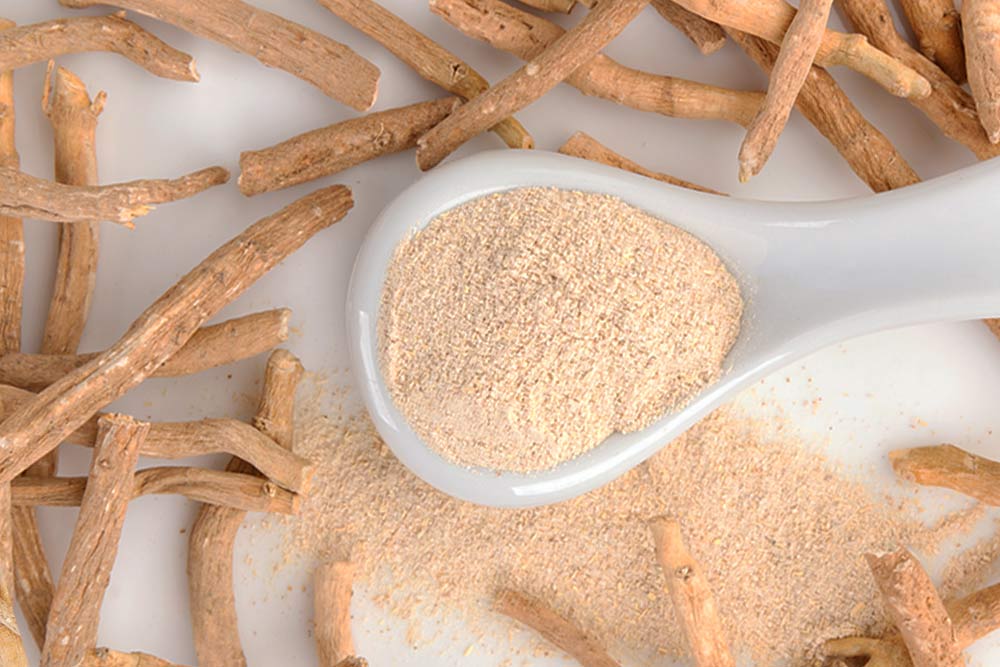Withania somnifera, or ashwagandha, is an evergreen shrub whose roots and leaves have been used for centuries in Ayurvedic medicine to treat anxiety, inflammation, insomnia, infertility, and other ailments. Recent research has confirmed ashwagandha’s healing properties, including its potential to improve skin health.
This article lists nine benefits of ashwagandha for the skin and explains how to use the plant to enjoy its skin-enhancing effects.

Ashwagandha Benefits for Skin
Research and user experience show that ashwagandha can help with the following skin concerns:
1. Ashwagandha for Hyperpigmentation
Hyperpigmentation is usually caused by environmental aggressors or hormonal changes. It manifests as dark patches on the skin (most commonly on the face) due to an overproduction of melanin. Ashwagandha is a promising treatment option for pigmentation concerns thanks to the abundance of the anti-pigmentation agent withaferin A.
2. Ashwagandha for Dry Skin
Numerous problems result from dry skin, including rough texture, itchiness, flakiness, and redness. Ashwagandha reduces transepidermal water loss and increases moisture levels, helping to rehydrate and soften the skin.
3. Ashwagandha for Skin Elasticity
The loss of skin elasticity naturally follows the aging process and leads to more prominent aging signs, such as deep wrinkles, nasolabial folds, and jowls. Research suggests ashwagandha may help promote collagen and elastin production, helping to rebuild and tighten the skin.
Note: Learn more about collagen and elastin, their differences and similarities, and why they are essential for youthful skin.
4. Ashwagandha for Fine Lines and Wrinkles
A study on the efficacy of ashwagandha lotion in healthy photoaged people revealed the plant can significantly reduce the appearance of aging signs caused by UV radiation, including fine lines and wrinkles. As a potent antioxidant, ashwagandha repairs cellular damage caused by free radicals. It also improves blood flow, nutrient and oxygen delivery to skin cells, and collagen production, helping to firm and smooth the skin.
5. Ashwagandha for Acne
Scientists found that, as a potent adaptogen (stress-relieving compound), ashwagandha reduced high cortisol levels that trigger inflammation and excess sebum production. By helping regulate natural oils, ashwagandha wards off acne-causing bacteria and decreases breakouts due to clogged pores.
Note: Learn what causes acne and how to avoid triggering breakouts.
6. Ashwagandha for Skin Inflammation
Inflammation can lead to various skin problems, from mild redness and dry skin to chronic conditions such as rosacea, eczema, and psoriasis. Ashwagandha has been shown to have anti-inflammatory effects thanks to withanolides, which modulate the expression of cytokines – proteins released by the immune system to regulate inflammation.
7. Ashwagandha for Skin Irritations and Injuries
Ashwagandha’s anti-inflammatory and hydrating properties have a soothing effect on irritated skin, decreasing sunburn, redness, and other irritations caused by environmental stressors. Researches show it also has antibacterial and antifungal qualities, helping to heal skin injuries (wounds, cuts, etc.).
8. Ashwagandha for Skin Glow
Poor sleep is linked to decreased skin health, causing faster skin aging, dull and dry skin, and reduced glow. Another study suggests that ashwagandha may improve sleep quality, indirectly improving the complexion.
9. Ashwagandha for Skin Cancer
In the past decade, ashwagandha has been studied for its potential in assisting treatment of several types of cancer, including malignant melanoma, breast, colon, ovarian, lung, liver, and pancreatic cancer. Thanks to its anti-inflammatory activity, it may help strengthen the effects of radiation and chemotherapy and reduce their adverse effects. Always seek advice from your physician before starting a new treatment.

How to Use Ashwagandha for the Skin?
The cosmetic industry has embraced the power of ashwagandha for the skin and introduced various products containing the plant’s oil or extracts, including lotions, serums, and moisturizers. The plant is also effective in the form of dietary supplements.
Ashwagandha in Skin Care
Because of its multifold skin-enhancing properties, ashwagandha is suitable for all skin types. Some of the products that incorporate it include:
- Brightening serums for dark spots and blemishes
- Night serums for dry, irritated, and aging skin
- Moisturizing creams for deep hydration
- Facial oils for protection against external aggressors
- Face mists for hydration and natural glow
- Shower gels for hydration and elasticity
The products’ effectiveness also depends on other ingredients in the formulation.
You can also make your own face masks and moisturizers at home by adding ashwagandha oil to carrier oils and other ingredients of choice.
Ashwagandha in Dietary Supplements
Ashwagandha supplements are growing in popularity because of their stress-relieving effect. Combined with appropriate skin care, they also help improve skin health. Oral supplements come in the form of tablets, capsules, pills, and powder, and the usual dosage is up to 1000 mg daily. They can be taken with or without meals, as advised on the product label.
Consult your healthcare provider before introducing any new product into your supplement regime.
Conclusion
Ashwagandha is a gentle, soothing herb with many beneficial properties for our skin and overall health. As a potent antioxidant, anti-inflammatory, and antibacterial agent, it adds more value to cosmetic products and supplements. Use it for at least one month to start feeling the plant’s rejuvenating effects.


